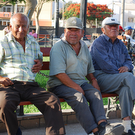
Korean researchers recently found that the percentage of cancerous plasma cells in the bone marrow, measured on day 14 post transplant, may predict disease progression in multiple myeloma patients following high-dose chemotherapy and stem cell transplantation.
However, because their study was small and retrospective in nature, the Korean researchers suggested that further studies be conducted to confirm their findings.
The standard treatment for myeloma patients under the age of 65 years currently consists of high-dose chemotherapy, followed by autologous stem …
Read the full story »

Results from a recent clinical study suggest that a new type of response, called an immunophenotypic response, strongly predicts disease progression in elderly multiple myeloma patients. Patients who achieved an immunophenotypic response had superior progression-free survival than patients who achieved a complete response or stringent complete response.
The authors suggested that testing for these three types of responses provides complementary information and that effort should be made to refine response criteria for multiple myeloma.
A number of previous studies have …
Read the full story »

Results of a recent study indicate that obesity does not negatively affect outcomes after stem cell transplantation in multiple myeloma patients. In fact, obese patients treated with high-dose melphalan-based chemotherapy and total body irradiation before transplantation had a lower risk of relapse and better overall survival, compared to normal-weight patients.
The study authors concluded that obese multiple myeloma patients should not be excluded from stem cell transplantation due to their weight.
“Obese patients don't seem to be at higher risk for severe …
Read the full story »

Italian researchers recently found that most myeloma patients are able to collect sufficient stem cells after a short course of induction therapy with Revlimid, allowing them to undergo two consecutive stem cell transplants.
“Revlimid can be used safely before stem cell mobilization, provided that we use only four courses before mobilization and cyclophosphamide is used to mobilize,” said Dr. Antonio Palumbo, lead author of the study and a researcher at the University of Torino in Italy.
The current standard treatment …
Read the full story »

A group of leading myeloma specialists, known as the International Myeloma Working Group, recently collaborated to develop guidelines for the prevention of infections in multiple myeloma patients. The group recommends that patients receive inactivated vaccines for the flu, hepatitis B, and polio as early in the disease as possible. Patients at high-risk of developing infections can be given medications to prevent infections.
Dr. Elias Anaissie of the Myeloma Institute for Research and Therapy at the University of Arkansas for Medical …
Read the full story »

A group of Italian researchers recently showed that consolidation therapy with Velcade, thalidomide, and dexamethasone was more effective than consolidation therapy with thalidomide and dexamethasone alone.
In particular, they found that the Velcade-based consolidation therapy yielded more high-quality responses, such as complete responses, and a high rate of molecular remission, in which patients showed no signs of remaining myeloma cells.
Dr. Michele Cavo from the Seragnoli Institute of Hematology in Bologna, Italy, presented the results at the 16th Congress of …
Read the full story »

The 47th annual meeting of the American Society of Clinical Oncology (ASCO) will take place Friday, June 3, through Tuesday, June 7, in Chicago.
More than 30,000 clinical specialists from all over the world are expected to attend the five-day meeting to discuss the current research in cancer treatment and care. This year’s meeting will primarily focus on the theme of “Patients, Pathways, Progress.”
The meeting will include many presentations and seminars focused specifically on multiple myeloma. The ASCO website …
Read the full story »

